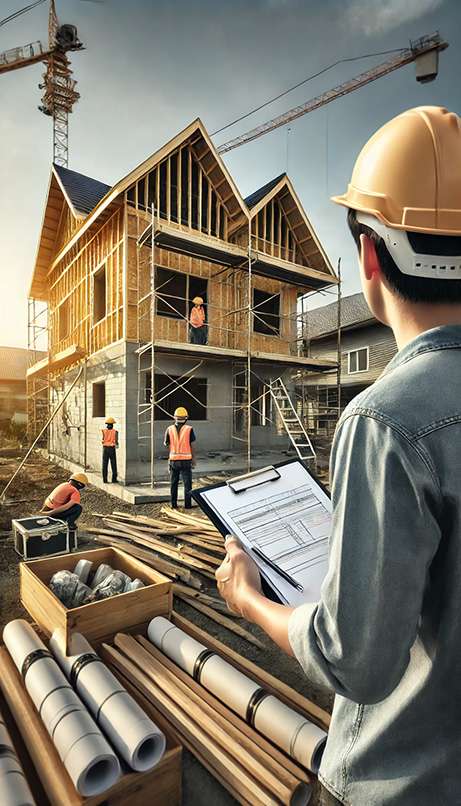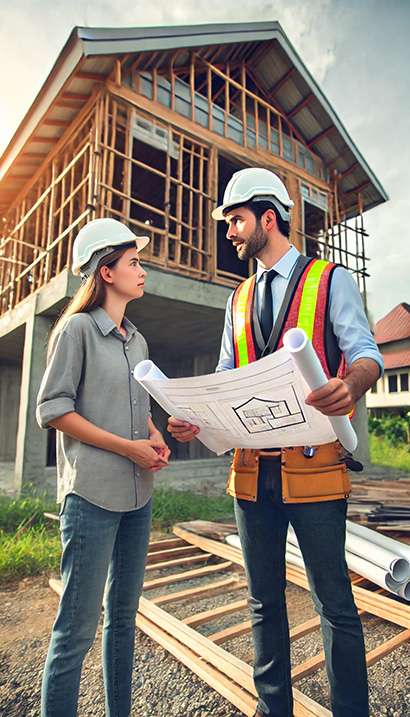Selecting the right contractor for your home-building project is a critical decision that can make or break your dream home. With so many contractors available, deciding who is best suited for your project can be overwhelming. Here are expert tips from Coat Construction Concepts to help you pick the best contractor for your next home-building project and ensure a smooth and successful construction experience.
Define Your Project Scope and Budget
Before you start looking for a contractor, it’s essential to have a clear understanding of your project scope and budget. Outline your project’s details, including the type of construction, materials to be used, desired completion timeline, and any specific requirements you have. Having a well-defined project scope will help you communicate effectively with potential contractors and ensure they understand your expectations.
References:
- HomeAdvisor –A Crash Course for Hiring a Contractor
- Remodeling Calculator- Remodel Calculator | Estimate Home Renovation Costs

Researching Contractors
1.Ask for Recommendations and Research
Begin your search by talking to friends, family, and neighbors who have completed similar projects. Personal referrals are invaluable because they come from trusted sources. Additionally, spend some time online researching contractors in your area. Look at their websites, read customer reviews, and check their ratings on platforms like the Better Business Bureau (BBB).
References:
- Better Business Bureau – Find a BBB Accredited Contractor
- Better Business Bureau – How Do I Find the Right Contractor?
- BuildZoom – Hiring Contractors Online
- BuildZoom – Part 2 Step 8: Finding the Right Builder for Your New Home
- NAHB – How to Choose a Home Builder According to the Experts

2. Check Online Reviews and Ratings
Websites like Yelp, Angie’s List, and Houzz are invaluable for reading reviews and ratings. Additionally, the Better Business Bureau (BBB) can help you find reputable contractors and avoid those with poor business practices.
3. Verify Licenses and Insurance
To ensure you’re dealing with a legitimate contractor, verify that they have the necessary licenses and insurance. Licensing requirements vary by state, so check with your local licensing authority. Make sure they have general liability insurance and workers’ compensation insurance to protect you from potential liabilities.
References:
4. Look for Professional Certifications and Affiliations
Professional certifications and affiliations with industry organizations can indicate a contractor’s commitment to their trade and adherence to industry standards. Look for certifications from bodies such as the National Association of the Remodeling Industry (NARI) or the National Association of Home Builders (NAHB).
References:
- National Association of the Remodeling Industry (NARI) – Certifications
- National Association of Home Builders (NAHB) – Professional Designations
5. Assess the Contractor's Experience and Expertise
Ensure that the contractor has specific experience and expertise in the type of project you are undertaking. Ask about their past projects that are similar in scope and complexity. This will give you confidence that they can handle your project effectively.
References:
- National Association of Home Builders (NAHB) – How to Choose a Builder
6. Consider the Contractor's Company Culture
The company culture of a contractor can influence the overall project experience. Look for a contractor with a positive, collaborative, and client-focused culture. This often translates into better service, more effective communication, and a smoother construction process.
References:
- Harvard Business Review – The Culture Factor
7. Assess Their Innovation and Adaptability
The construction industry continually evolves with new materials, techniques, and technologies. Choose a contractor who stays up-to-date with industry trends and is willing to incorporate innovative solutions into your project.
References:
- Construction Dive – Modular Construction- Forging a New Path in Rapid Construction
- Construction Dive- Building a Solid Foundation: How AI is Minimizing risk and enabling Contract Compliance on Projects
Conducting Interviews
1. Interview Multiple Contractors
Don’t settle for the first contractor you come across. Interview at least three contractors to compare their bids, communication style, and professionalism. During the interview, ask about their experience, similar projects they have completed, and their approach to handling unexpected challenges.
Craft specific questions to ask potential contractors. Key inquiries should include:
- How long have you been in business?
- Can you provide a list of references?
- Are you licensed and insured?
- Who will be managing the project on-site?
Such questions help gauge the contractor’s reliability and capability.

2. Ensure Clear Communication
Effective communication is key to a successful construction project. Choose a contractor who communicates clearly and regularly. They should provide you with updates on the project’s progress, address any concerns promptly, and be open to discussing any changes or issues that arise.
References:
- ConstructConnect – 6 Keys to Better Construction Communication
3. Understand Their Project Management Style
Project management is crucial to the timely and efficient completion of your project. Ask your contractor about their project management process, including scheduling work, managing the supply chain, handling permits, and ensuring quality control.
References:
- Project Management Institute (PMI) – Construction Extension to the PMBOK® Guide
4. Consider Their Workload and Availability
A contractor’s current workload can affect their ability to focus on your project. Ask about their current and upcoming projects to gauge whether they have the capacity to dedicate sufficient time and resources to your project.
References:
- Pro Crew Schedule – Tips to Perfect the Process of Workload Management in Construction
5. Look Into Financing Options
While some contractors may not offer direct financing, they might have relationships with financial institutions that can help you secure a loan. Ask about their recommendations for financing your project if needed.
References:
- Bankrate – Home Improvement Loan Calculator
- NerdWallet – Best Home Improvement Loans
6. Inspect Their Safety Record
Safety is paramount on any construction site. Ask the contractor about its safety record, worker training programs, and compliance with Occupational Safety and Health Administration (OSHA) regulations.
References:
- Occupational Safety and Health Administration (OSHA) – Safety and Health Topics
- ConstructionDive – The Most Important Action You Can Take to Make Project Team Safer in 2022
7. Check for Dispute Resolution Policies
Even with the best planning, disputes can arise during construction projects. Ask the contractor about their dispute resolution policies. Understanding how they handle disagreements and the processes in place to resolve conflicts can save you a lot of stress.
References:
- American Arbitration Association – Construction Dispute Resolution
- JAMS – Construction Dispute Resolution
8. Visit Ongoing Projects
Visit one of the contractor’s current job sites. This will give you a sense of how they operate daily. Look for signs of a well-organized, clean, and safe job site. Observe the professionalism of the crew and the quality of their work.
9. Check References and Past Work
Request references from past clients and follow up with them to learn about their experience working with the contractor. Ask about the quality of work, adherence to timelines, communication, and any issues that arose during the project. Additionally, visit some of the contractor’s completed projects to inspect the quality of their work firsthand.
References:
BuildZoom – How to Avoid Scams and Find a Trustworthy Contractor
10. Evaluate Their Subcontractor Network
Many contractors rely on subcontractors for specialized tasks. Ensure that your contractor works with reputable and experienced subcontractors. Ask for information on their subcontractors’ qualifications and how they manage and coordinate these teams.
References:
- Angie’s List – How to Hire Subcontractors: Helpful Guide for Contractors
11. Investigate Their Supplier Relationships
Contractors often rely on a network of suppliers for materials. Strong relationships with reliable suppliers can lead to better pricing and timely materials delivery. Ask about their suppliers and how they manage these relationships.
References:
- Construction Business Owner – Reshaping Supplier Relationships Technology Age
- Live About Dotcom – Ethics in Purchasing Materials and Services
Reviewing Bids and Estimates
Before signing any contract, review it thoroughly to ensure it includes all the project details, timelines, payment schedules, and warranty information. The contract should also specify the scope of work, materials to be used, and the process for handling changes or disputes. If anything is unclear, ask for clarification or seek legal advice.
1. Compare Multiple Bids
Obtain detailed bids from at least three contractors.
*Detailing Project Specifications**
Ensure the contract includes:
– Detailed project description and scope
– Specific materials to be used
– Start and completion dates
– Payment schedule
This will help you compare and contrast each contractor’s proposal objectively.
References:
- U.S. Federal Trade Commission (FTC) – How to Avoid a Home Improvement Scam
- BuildZoom – Part 2 Step 10: Evaluating Estimates

2. Avoid the Lowest Bid Trap
While it might be tempting to go with the lowest bid, it could indicate subpar materials or workmanship. The adage “you get what you pay for” often rings true in construction.
3. Analyze Line-Item Costs
Review the details of each bid carefully. Look for any inconsistencies or unclear terms, and clarify these with the contractor. Ensure that the bid aligns with your project scope and budget.
References:
4. Negotiating with Contractors
Negotiating with contractors is a critical part of the home-building process. It helps you secure a fair price, establish clear expectations, and ensure mutual satisfaction with the agreement. Start by researching market rates to understand the average costs for similar projects. Be transparent about your budget and obtain multiple bids to compare offers. Negotiate clear payment terms, realistic timelines, and detailed materials and project scope specifications.
Establish a change order policy to manage project modifications and include warranties and guarantees in the contract. Maintaining a professional demeanor throughout the negotiation process can help build a positive working relationship and set the foundation for a successful project. Additionally, be prepared to walk away if the terms do not meet your expectations. Remember, there are many qualified contractors available.
References:
- HomeAdvisor – Cost Guide
Finalizing the Contract
1. Detail Project Specifications
Ensure the contract includes:
- Detailed project description and scope
- Specific materials to be used
- Start and completion dates
- Payment schedule
References:
Construction Business Owner – Create a Plan for Project Protection
2. Understand Payment Schedules/Milestone Payments

Be wary of contractors who demand a significant upfront payment or full payment before the project starts. A reputable contractor will have a reasonable payment schedule that aligns with project milestones. Typically, a small deposit is made upfront, with subsequent payments made as work progresses and specific milestones are achieved.
References:
- Angie’s List – How Much Should I Pay A Contractor Upfront?
- Crewcost – Contractor Payment Schedules: Your Essential Guide
3. Review Their Change Order Policy
Understand how the contractor handles change orders. Change orders modify the original project scope and can impact the timeline and budget. A clear and fair change order policy can prevent disputes and ensure smooth project progression.
References:
- Constructconnect- A Quick Guide to Managing Change Orders in Construction
4. Verify Warranties and Guarantees
A good contractor will offer a warranty on their work and provide post-project support. Ensure you understand what the warranty covers and its duration. Additionally, find out how they handle post-project issues or repairs. A typical warranty should cover workmanship and materials for at least one year after project completion (NAHB, 2021).
References:
- Marketwatch – Best Home Warranties for New Construction (2024)
- Federal Trade Commission Consumer Advice – Warranties for New Homes
Monitoring the Construction Process
1. Regular Site Visits and Updates
Stay involved in the project by regularly visiting the site and staying in touch with the contractor. While it’s important to trust your contractor, your involvement lets you catch potential issues early and ensures the project stays on track. It also shows the contractor that you are invested in the project’s success.
References:
- Construction Business Owner- Project Cost Management
2. Document Everything
Keep detailed records of all communications, contracts, payments, and changes. This documentation helps resolve disputes and ensures accountability.

3. Conduct Quality Control Checks
Regularly inspect completed work to ensure it meets your expectations and complies with agreed-upon standards. Do not hesitate to raise concerns immediately if you notice any issues.
Handling Unexpected Issues
1. Address Changes and Issues Promptly
Construction projects often encounter unexpected changes or issues. Work with your contractor to address these promptly and find solutions that keep the project on track. Clear communication and flexibility are crucial in navigating these challenges.
References:
- ProjectManager – Construction Change Order Management Process
- New Lyfe Accounting – How to Manage Construction Project Delays
2. Maintain Professionalism and Patience
Construction can be stressful, but maintaining a professional and patient demeanor fosters a collaborative environment. Building mutual respect with your contractor can lead to a more successful project outcome.

Post-Construction Wrap-Up
1. Construction Cleanup and Site Management
After your project is completed, a professional contractor will ensure the job site is thoroughly cleaned and safe. Ask about their post-construction cleanup policies and how they manage waste and debris. A well-maintained site after construction reflects the contractor’s commitment to quality and attention to detail.
References:
- OSHA – Construction Waste Management- 1926.252 Disposal of Waste Materials
- OSHA – Construction Wast Management – Housekeeping Occupational Safety and Health Provisions
- Diamond Cleaning – Understanding OSHA Regulations for Construction Site Cleaning
- EPA – Construction & Demolition Waste

2. Final Inspection and Punch List
Before making the final payment, conduct a thorough inspection and create a punch list of any remaining tasks. Ensure the contractor addresses these items promptly.
3. Obtain Completion Documents
Collect all necessary documentation, including lien waivers, warranties, and copies of the permits. This ensures you have all the legal documents required for future reference.
4. Leave a Review
Provide feedback and leave reviews based on your experience. This will help other homeowners and improve the overall quality of contractors in your community.
Conclusion
Choosing the right contractor for your home-building project is vital in ensuring a successful outcome. You can find a contractor who meets your needs and expectations by defining your project scope, researching and interviewing multiple contractors, verifying credentials, and maintaining clear communication. Remember, a well-chosen contractor will deliver quality work and provide a positive construction experience.
By following these expert tips and utilizing reputable sources, you can confidently select the best contractor for your next home-building project, making your dream home a reality. Those in need of a reliable and professional contractor should consider reaching out to Coats Construction Concepts. Our team of experienced professionals delivers high-quality construction services tailored to your specific needs. Contact us today to start building your dream home!
